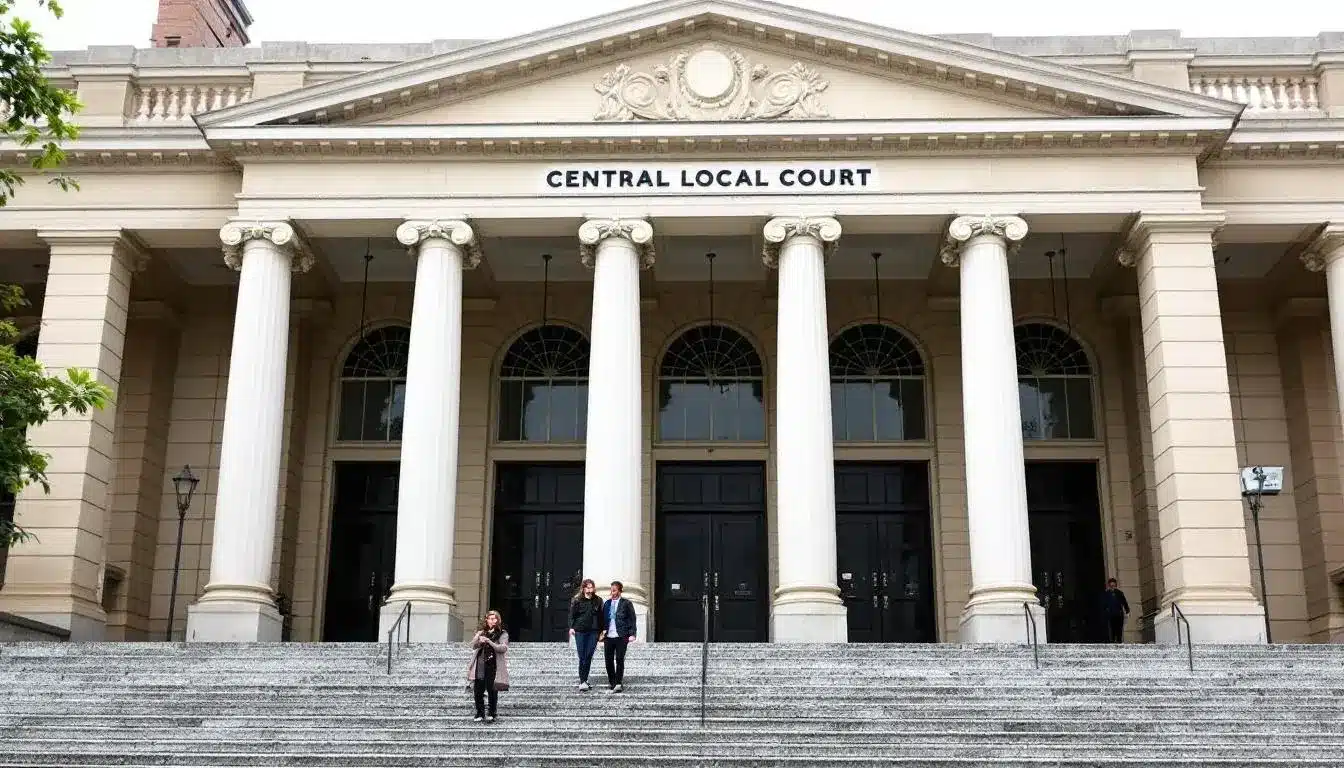Navigating the legal system can be daunting, especially when facing a court appearance. At Jameson Law, we understand the importance of being well-informed about court procedures.
This guide focuses on Central Local Court, a key venue for Sydney criminal lawyers and their clients. We’ll cover everything from court structure to what to expect during your visit, helping you feel more prepared and confident.
Where is Central Local Court Located?
Location and Accessibility
Central Local Court stands at 98 Liverpool Street, Sydney NSW 2000. This prime location in Sydney’s CBD offers easy access for lawyers, defendants, and witnesses. The court’s central position puts it within walking distance of major public transport hubs, including Museum Station and Town Hall Station.
Types of Cases Heard
District Courts hear a variety of criminal matters, including indictable offences such as assault, sexual assault, and murder. They also handle:
- Drug offences
- Theft
- Domestic violence cases
The court also processes bail applications, which are vital for defendants who seek release from custody while awaiting trial.
Court Structure and Key Personnel
Central Local Court operates under a hierarchical structure. Magistrates preside over cases and make decisions on bail and sentencing for summary offences.
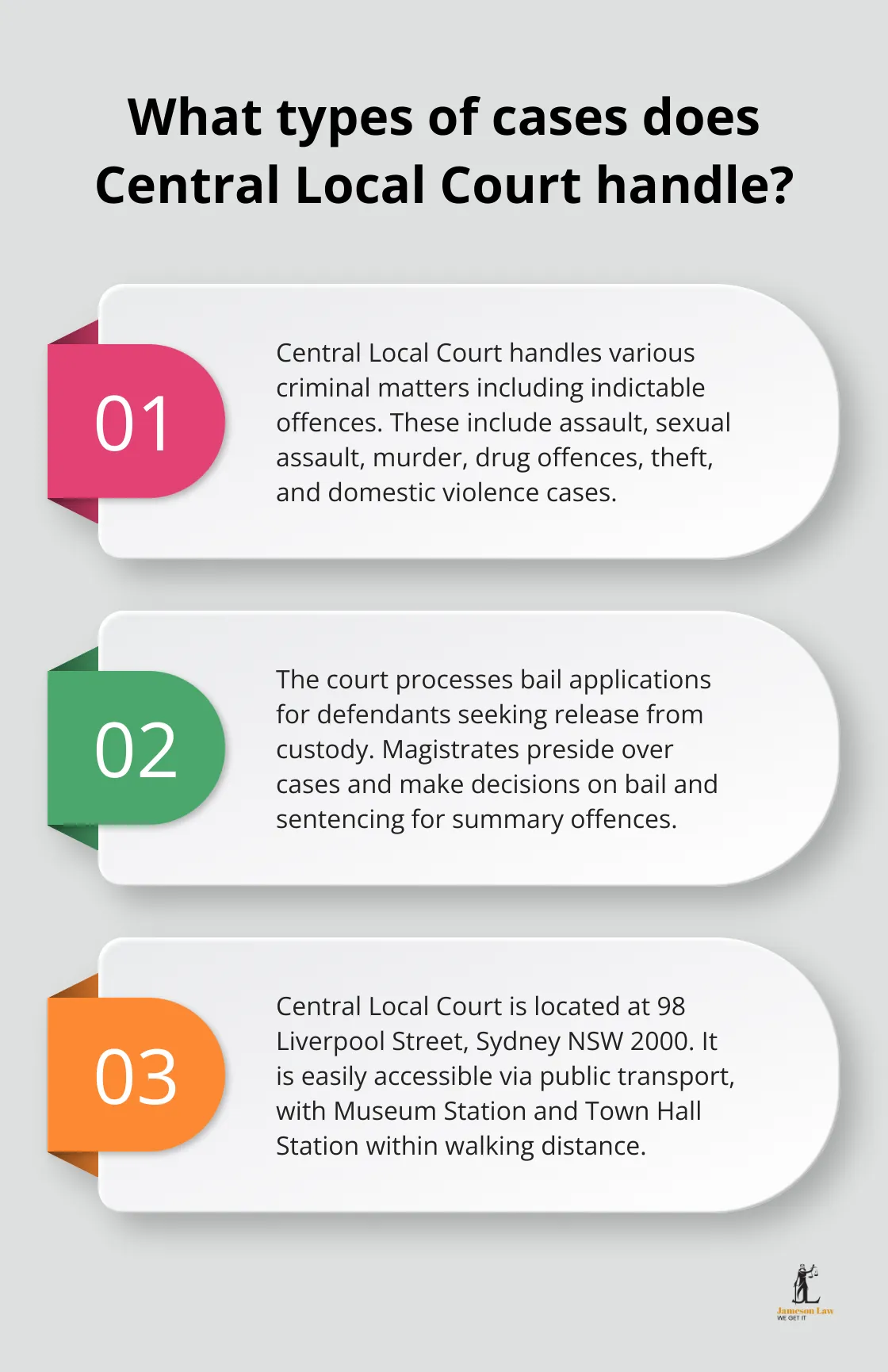
Key personnel at Central Local Court include:
- Magistrates: They hear evidence, make rulings, and pass sentences in less serious cases.
- Court officers: They maintain order in the courtroom and assist with administrative tasks.
- Prosecutors: Representing the Crown, they present cases against defendants.
- Defence lawyers: They represent defendants, presenting their case and advocating for their rights.
Court Hours and Procedures
All opening times for local courts in NSW are online, and you can use the court listing and sittings information to find out when a local court sits.
The NSW Online Registry serves as a valuable resource for case tracking and accessing relevant documentation. If you’re a party to a case in the NSW Local, District or Supreme Court, you can use the NSW Online Registry website to search for cases.
As we move forward, it’s important to understand what to expect when attending Central Local Court. The next section will cover security procedures, court etiquette, and typical proceedings to help you prepare for your court appearance.
What to Expect When Attending Central Local Court
Security Procedures and Prohibited Items
When you arrive at Central Local Court, you’ll encounter airport-style security screening. Metal detectors and x-ray machines scan for prohibited items. Don’t bring weapons, sharp objects, or illegal substances to avoid complications. Mobile phones are allowed but must be switched off in courtrooms. The court strictly forbids cameras and recording devices without prior permission.
Court Etiquette and Dress Code
Your appearance and behaviour matter in court. Dress conservatively and respectfully (no shorts, singlets, or clothing with offensive slogans). While suits aren’t mandatory, clean and neat attire is expected. In the courtroom, stand when the magistrate enters or leaves. Address the magistrate as “Your Honour” and speak clearly and respectfully when called upon. Avoid interruptions or disruptive noises.
Typical Court Proceedings and Timelines
The court operates Monday to Friday, with registry hours from 9:00 AM to 4:00 PM. However, specific court times can vary depending on the case. You should arrive at least 30 minutes early to clear security and locate your courtroom. Check the electronic boards for your name and courtroom number. For first appearances, you’ll likely enter a plea. The magistrate will explain the charges and ask for your plea (guilty or not guilty). If you’re unsure, you can request an adjournment to seek legal advice.
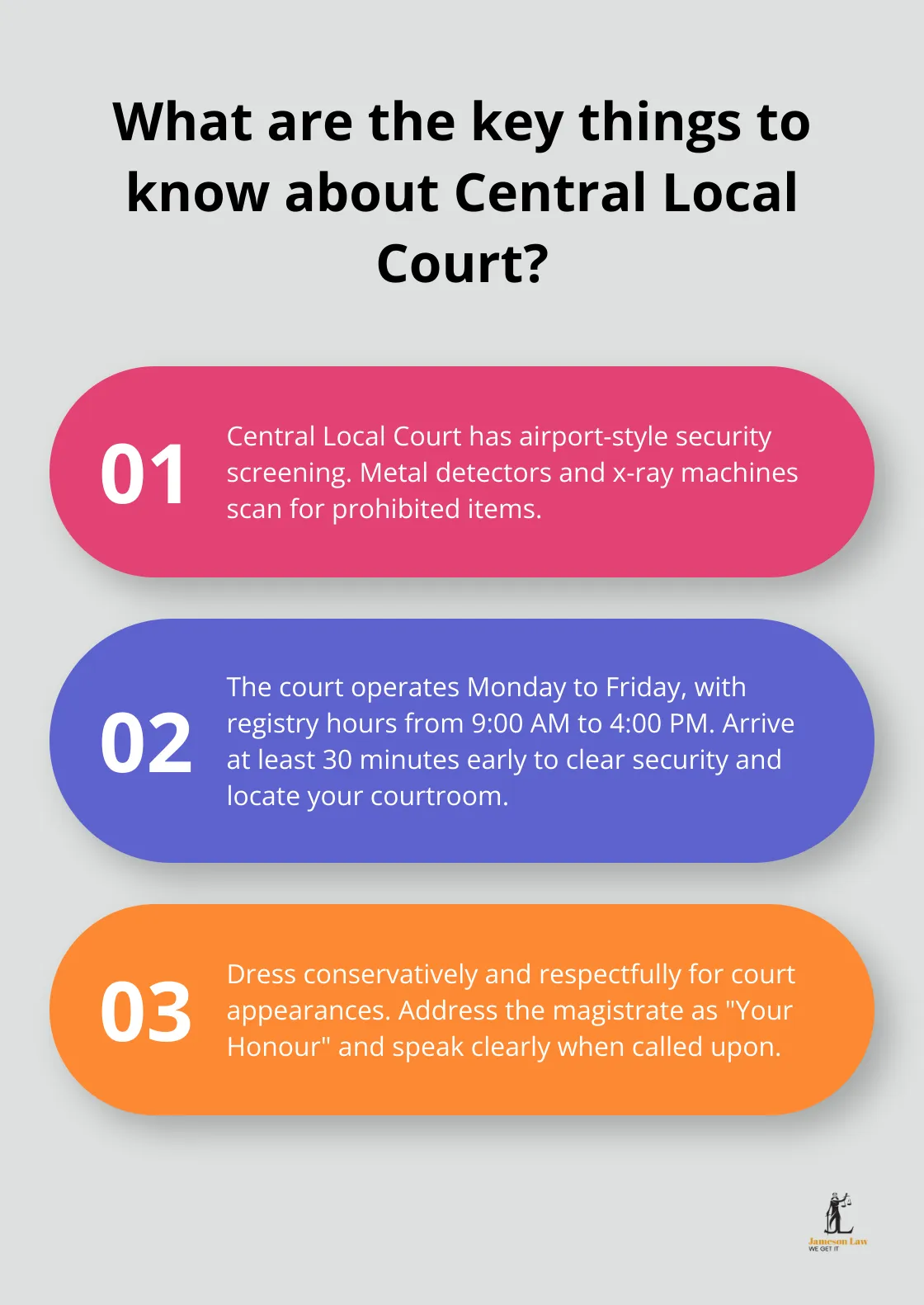
Minor offences might resolve on the same day, while complex matters often require multiple appearances (called “mentions”). During mentions, progress is reported and further directions are given. If you represent yourself, prepare to state your case clearly and concisely. Organise all relevant documents for easy presentation.
Navigating Delays and Preparations
Court proceedings can be unpredictable, so prepare for potential delays. Bring essentials like water and any necessary medications. The court environment can be stressful, so try to stay calm and focused throughout the process.
Legal Representation Options
While self-representation is possible, having a lawyer can significantly impact your case outcome. Lawyers understand court procedures, can negotiate with prosecutors, and advocate for your rights effectively. If you can’t afford a private lawyer, you might qualify for legal aid. Community legal centres also offer low-cost or free legal advice.
As you consider your options for legal representation, it’s important to understand the benefits of having a lawyer by your side at Central Local Court. Let’s explore this topic in more detail in the next section.
Legal Representation at Central Local Court
The Importance of Professional Advocacy
A lawyer’s expertise can significantly influence your case outcome at Central Local Court. Legal representation can be beneficial, but it’s important to note that this information is not a substitute for professional legal advice. Lawyers understand the intricacies of the law and can present compelling arguments on your behalf.
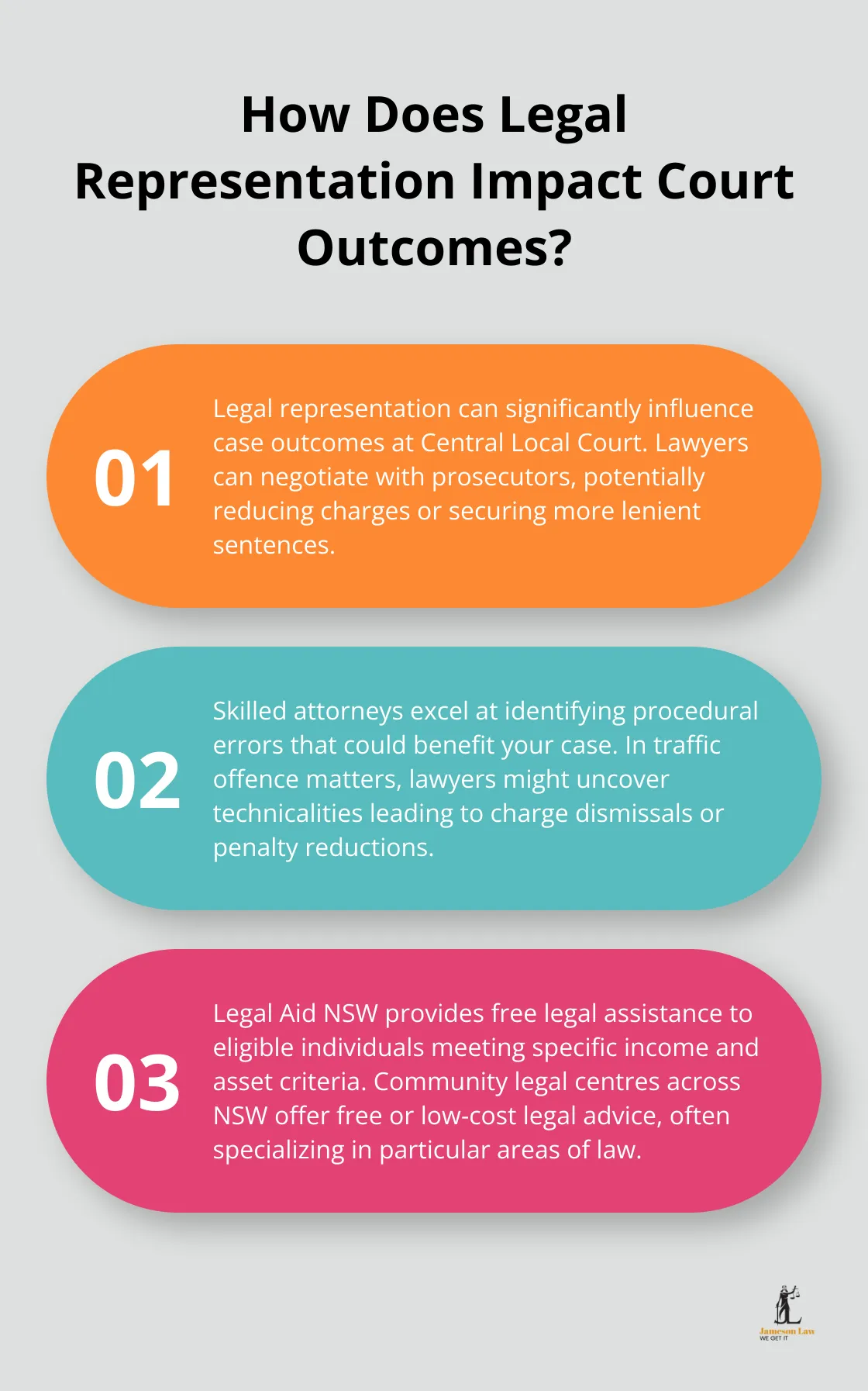
Skilled attorneys can negotiate with prosecutors, potentially reducing charges or securing more lenient sentences. They excel at identifying procedural errors that could benefit your case. For example, in traffic offence matters, a lawyer might uncover technicalities that lead to charge dismissals or penalty reductions.
How to Find the Right Legal Representation
Selecting the appropriate lawyer is vital for your case. Start by seeking recommendations from trusted sources or contact the Law Society of NSW for referrals. Many law firms offer free initial consultations to discuss your case (this can help you gauge their expertise and approach).
When choosing a lawyer, consider their experience with cases similar to yours and their familiarity with Central Local Court procedures. Ask about their success rates and communication style. A lawyer who keeps you informed and explains complex legal concepts clearly can reduce your stress during the legal process.
Legal Aid and Community Services
For those facing financial constraints, legal aid options exist. Legal Aid NSW provides free legal assistance to eligible individuals. To qualify, you must meet specific income and asset criteria, and your case must have merit.
Community legal centres across NSW also offer free or low-cost legal advice. These centres often specialise in particular areas of law and can provide valuable guidance.
Financing Your Legal Representation
If you’re ineligible for legal aid but still struggle with legal fees, discuss payment plans with your chosen law firm. Many offer flexible financing options to ensure you can access quality legal representation.
Investing in legal representation can often save you money in the long run. It may potentially reduce fines, help you avoid jail time, or preserve your employment opportunities. The cost of a skilled lawyer often pales in comparison to the potential long-term consequences of inadequate representation.
Final Thoughts
Central Local Court presents challenges, but preparation can improve your experience and case outcome. The court’s location in Sydney’s CBD offers easy access, yet early arrival remains essential to navigate security and find your courtroom. Proper etiquette, appropriate attire, and respectful behavior can positively influence court perceptions.
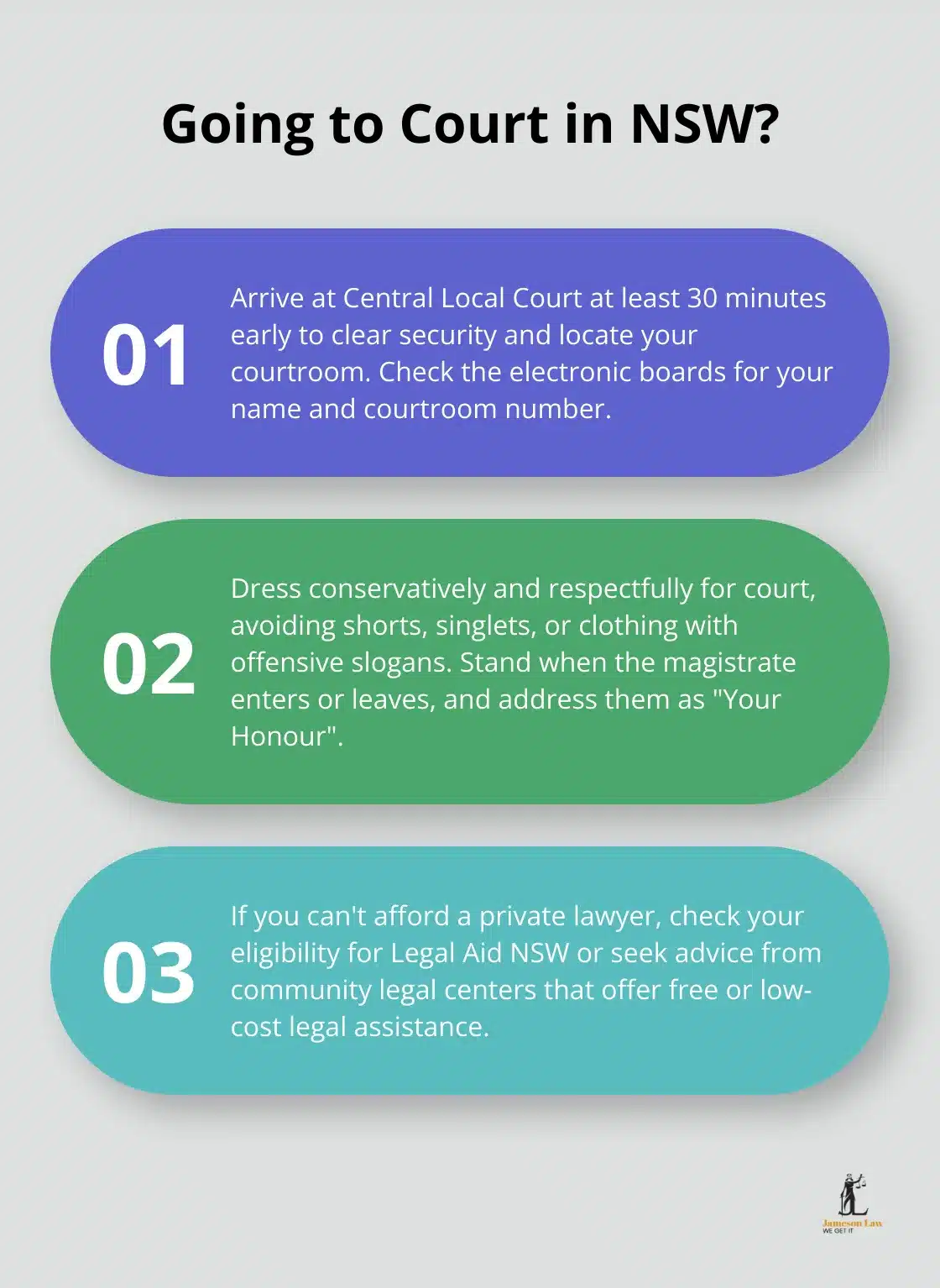
Legal representation can significantly impact your case at Central Local Court. A skilled lawyer can navigate complex procedures, negotiate with prosecutors, and advocate for your rights effectively. Self-representation is possible, but professional expertise often proves invaluable in achieving favorable outcomes.
Jameson Law offers expert assistance for those facing legal challenges at Central Local Court. Our team of Sydney criminal lawyers brings extensive experience to your case, providing tailored legal support across various practice areas (including criminal law and traffic offenses). We strive to guide you through the legal process with clarity and confidence.



